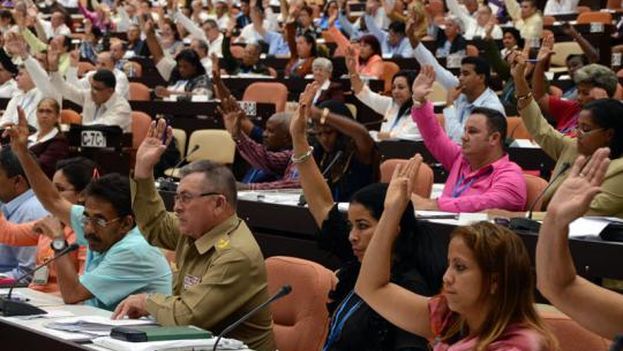
![]() 14ymedio, Reinaldo Escobar, Havana, 26 October 2017 — On the eve of the People’s Power elections in Cuba, the issue of representation in municipal, provincial and national bodies has again come to life, this time in an interview in Cubadebate with Gisela María Duarte Vázquez, president of the National Candidacy Commission.
14ymedio, Reinaldo Escobar, Havana, 26 October 2017 — On the eve of the People’s Power elections in Cuba, the issue of representation in municipal, provincial and national bodies has again come to life, this time in an interview in Cubadebate with Gisela María Duarte Vázquez, president of the National Candidacy Commission.
The official insists that diversity among the representatives of the people is guaranteed by the appropriate proportion in the number of men and women, young people, students, workers, farmers, technicians, professionals, those engaged in more significant economic activities, state and non-state workers.”
This range of genres, ages and activities – together with an unmentioned intention to achieve a racial balance and a more or less equitable territorial distribution – forms a mural that represents the population of the country but with a common denominator: identification with the politics outlined by the Communist Party of Cuba (PCC).
The president of the Candidacy Commission does not present it so directly, but refers to several of the catchphrases that reflect the PCC line, such as “commitment to the Revolution,” “commitment to the people,” or “the concept of Revolution that Fidel bequeathed us.”
One of the most widespread criticisms of the current Electoral Law is precisely the existence of these commissions that should guarantee the representativeness of the people in the different People’s Power Assemblies, from the local level up to the national level, but that do not consider the diversity of political opinions.
Duarte Vázquez explained that in the process of preparing the lists of candidates, “as much as possible, we consult the opinions of as many institutions, organizations and workplaces as are necessary, as well as the opinions of the delegates to the Municipal Assemblies of People’s Power.”
This consultation does not exclude information that may also be provided by the organs of State Security and the opinions of the ever-vigilant Committees for the Defense of the Revolution (CDR).
The main argument put forward by the Candidacy Commission is, according to the president, that the system “does away with every kind of stage for conflict, competition and politicking and promotes merit, capacity and commitment to the people” as the elements to consider.
The confusion between “politicking” and politics has its roots in the republican past and refers to the murky maneuvers, frauds, and unfulfilled promises of unscrupulous characters of the last century who exchanged their votes for hospital beds and even enrolled the deceased on the voter lists.
What no one can explain is, why it is that the voters are not allowed to know the platforms of their candidates and must vote for someone without knowing how they will act in Parliament when they become a deputy.
Examples include such controversial issues as the solution to the dual monetary system, the approval of same-sex marriage, the acceptance of small and medium-sized enterprises, the definitive abolition of the death penalty or the end of immigration restrictions, which oblige Cubans residing abroad to update their Cuban passports on a regular basis, even if they have adopted another nationality.
Hypothetically, at least two lists of candidates with equal diversity in the areas of race, sex, age or occupation could be formed in parallel, and with the same social merits, but that would vote differently in these matters.
The function of a parliament is to subject proposals to discussion and to vote for proposals whose essential differences are of a political nature. When a Candidacy Commission annuls diversity of opinions or ignores them, the possibility of political opinions ascending from the people to the powers-that-be through the democratic vote is lost.
It doesn’t matter if they are excellent workers, great students, good parents and better children; equity between men and women and between old and young is useless if the balance between political tendencies can not be measured, resulting not only from the successful or unsuccessful outcome of governmental decisions but also from the many existing ideological currents in the world.
When Cuba has a new electoral law the first thing that must disappear is this Candidacy Commission. The difficulty is that in order for voters to find out how their candidates think, they would have to enjoy sufficient freedom of expression to make their approaches known, and also enjoy freedom of association in order to agree on proposals.
